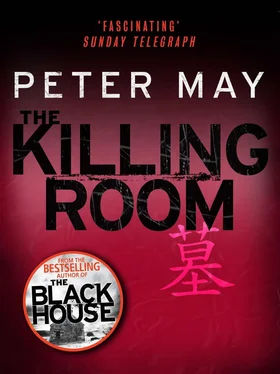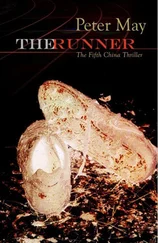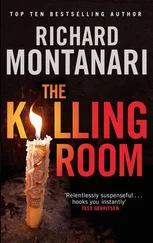Peter May - The Killing Room
Здесь есть возможность читать онлайн «Peter May - The Killing Room» весь текст электронной книги совершенно бесплатно (целиком полную версию без сокращений). В некоторых случаях можно слушать аудио, скачать через торрент в формате fb2 и присутствует краткое содержание. Год выпуска: 2012, Издательство: Quercus, Жанр: Триллер, на английском языке. Описание произведения, (предисловие) а так же отзывы посетителей доступны на портале библиотеки ЛибКат.
- Название:The Killing Room
- Автор:
- Издательство:Quercus
- Жанр:
- Год:2012
- ISBN:нет данных
- Рейтинг книги:5 / 5. Голосов: 1
-
Избранное:Добавить в избранное
- Отзывы:
-
Ваша оценка:
- 100
- 1
- 2
- 3
- 4
- 5
The Killing Room: краткое содержание, описание и аннотация
Предлагаем к чтению аннотацию, описание, краткое содержание или предисловие (зависит от того, что написал сам автор книги «The Killing Room»). Если вы не нашли необходимую информацию о книге — напишите в комментариях, мы постараемся отыскать её.
The Killing Room — читать онлайн бесплатно полную книгу (весь текст) целиком
Ниже представлен текст книги, разбитый по страницам. Система сохранения места последней прочитанной страницы, позволяет с удобством читать онлайн бесплатно книгу «The Killing Room», без необходимости каждый раз заново искать на чём Вы остановились. Поставьте закладку, и сможете в любой момент перейти на страницу, на которой закончили чтение.
Интервал:
Закладка:
Mei-Ling’s cheeks reddened. Anger was mixed now with hurt, and she retreated into herself like a wounded animal. She nodded and kept her eyes fixed firmly on the traffic in the road ahead. They did not speak again until she turned the car into the car park outside the red-roofed villa that housed Cui Feng’s central clinic.
The clinic was set behind a high gated wall and a profusion of densely leafed trees in a quiet residential street on the edge of the consular district. This had once been the heart of the old French Concession. Elegant villas sat brooding in discreet isolation behind walls and fences. Private cars were parked along secluded, tree-lined avenues, with only the odd cyclist whirring past on a rickety bicycle. What had once been the garden of the villa was paved, and half a dozen cars sat backed up against the wall. A small private ambulance was parked under a canopy supported by two pillars above the main entrance. The windows had all been double-glazed, and the view into their interior was obscured by cream-coloured vertical blinds. A brass plaque on the gate revealed in Chinese and English that this was the SHANGHAI WORLD CLINIC.
A nurse in a white, starched uniform led them up thickly carpeted stairs and along a passageway hung with original scroll paintings by famous Chinese artists. It felt more like an opulent private residence than a medical clinic. They passed an oriental gentleman in a wheelchair being pushed by a male nurse, and then were shown into a large study with a sofa and two armchairs gathered around an original fireplace. There was a huge, leather-tooled desk in the bay window, stripes of watery daylight falling in through the blinds and lying across the contours of the captain’s chair that sat behind it. Cui Feng came around the desk as they entered. He wore an expensively cut dark suit and had the same gentle bedside manner of the family doctor that Li remembered from their first meeting at Director Hu’s banquet. Soft spoken and smiling, he shook their hands warmly, inviting them each to take an armchair. ‘It is a great pleasure to meet you again, Deputy Section Chiefs.’ He gave a small laugh at his plural abbreviation. ‘It is a great relief that you share a rank,’ he said, ‘or we could be here all day just addressing each other.’ He sat down on the edge of the settee and leaned forward, his elbows on his knees, and placed his hands together almost as if in prayer. ‘Now what can I do for you?’ he asked. ‘I understand that some of those poor women you dug up had abortions done at some of my clinics.’ And Li realised that Huang had already been on the phone to Cui to smooth the way for their arrival.
‘That’s right,’ Li said. ‘In fact all the victims have had abortions performed on them.’ He hesitated for the briefest of moments before adding, ‘Not very expertly, according to our pathologist. Otherwise it would have been very difficult to tell.’
But Cui was not ruffled. He said, ‘In that case, perhaps they were not all performed at my clinics. We operate to very high procedural standards.’
‘I don’t doubt it,’ Li said. ‘But since you perform most of the abortions in Shanghai, this seemed like a good place to start.’
‘Start what, exactly?’ Cui appeared uncomfortable for the first time.
Mei-Ling stepped in quickly to prevent Li from discomfiting him any further. ‘We were wondering, Mr Cui, if you would allow us access to your files so that we could cross-check them with the women on our missing persons file.’
He frowned. ‘What good would that do?’
‘It might help us narrow down the identities of the remaining victims,’ Li said.
Cui pursed his lips and turned this over briefly in his mind. Then, ‘All right,’ he said. ‘I can see no harm in it. But since our files are normally confidential, perhaps I could appoint one of my staff to liaise with your people and do the actual comparisons. That way we could continue to maintain the confidentiality of our patients.’
Li was not happy with this proposal. He wanted direct access to the files and was about to say so. But he glanced at Mei-Ling and picked up her almost imperceptible shake of the head, Huang’s words of warning about Cui’s membership of the Party and his influential friends still ringing in his ears. So he forced a reluctant nod of agreement instead. ‘That would be acceptable,’ he said.
‘Good.’ Cui relaxed and sat back in the settee. ‘You will have some tea.’ It was not so much a question as a statement. Li and Mei-Ling had no time to respond before there was a knock at the door and a young woman carried in a tray with a pot of jasmine tea and three cups of the most delicate bone china. She set it on a low table in front of the fireplace and filled the cups before making a small bow and hurrying out.
‘So do you actually perform abortions here at this clinic?’ Li asked.
‘Good Heavens, no,’ Cui said smiling at Li’s apparent naïveté. ‘The Shanghai World Clinic is exclusively for the use of foreign residents living in Shanghai.’ He laughed. ‘Generally very wealthy people whose companies provide comprehensive medical insurance. We Chinese might as well make the most of any ill-health that befalls them while they’re here, don’t you think?’
Li did not think that anyone should profit from ill-health, but he knew better than to say so. Instead he said, ‘And what kind of medical care do you provide, exactly?’
‘Oh,’ Cui said airily, ‘we can deal with anything from a broken toe to open heart surgery. We have a highly qualified and very experienced international team of doctors and nurses here. And if we don’t have the expertise in-house, we bring in consultants on a freelance basis.’
‘So the bulk of your patients are American, or European,’ Mei-Ling said.
Cui smiled and shook his head. ‘Actually no, Miss Nien. There are a number of North American or European joint-venture clinics in Shanghai which the Westerners seem to prefer. Perhaps they think that Chinese medicine only deals in acupuncture and tiger’s blood.’ There was the merest hint of a bitter edge to his voice. ‘Surprisingly, perhaps, most of our customers are Japanese.’ Li noticed his use of the word ‘customers’ rather than ‘patients’. It was clear that to Cui medicine was a business and illness an opportunity to make money. Cui said, ‘Would you like to see our facilities?’
Li had no desire to inspect the facilities. He disliked all things medical and had a morbid fear of hospitals, which perhaps owed more than a little to all the autopsies he had attended. But before he had a chance to decline the offer, Mei-Ling said, ‘Yes, we’d like that very much.’ Li had forgotten that she had studied medicine for four years, but he was still a little surprised by her apparent interest.
The clinic was on four floors, including a suite of rooms built into the roof, and a large basement which housed two operating theatres, as well as preparation and recovery rooms. A large elevator had been installed to take patients from operation in the basement to recovery in the attic, and all stops in between. There was a four-bed intensive care ward on the ground floor, as well as several luxurious single-bed rooms that made Li think more of a four-star hotel than a hospital. Each room had en-suite toilet facilities and satellite TV. Office and administration was on the first floor, with another four single-bed rooms. There were a further six bedrooms in the attic. ‘At any one time,’ Cui said, ‘we can accommodate fourteen patients as well as our four intensive care beds.’ But on their tour, Li had seen only a handful of patients. The clinic was far from full.
‘You don’t appear to be very busy,’ he said. For some reason he had begun to take a singular dislike to Mr Cui. He was altogether too smooth, too possessed.
Читать дальшеИнтервал:
Закладка:
Похожие книги на «The Killing Room»
Представляем Вашему вниманию похожие книги на «The Killing Room» списком для выбора. Мы отобрали схожую по названию и смыслу литературу в надежде предоставить читателям больше вариантов отыскать новые, интересные, ещё непрочитанные произведения.
Обсуждение, отзывы о книге «The Killing Room» и просто собственные мнения читателей. Оставьте ваши комментарии, напишите, что Вы думаете о произведении, его смысле или главных героях. Укажите что конкретно понравилось, а что нет, и почему Вы так считаете.












